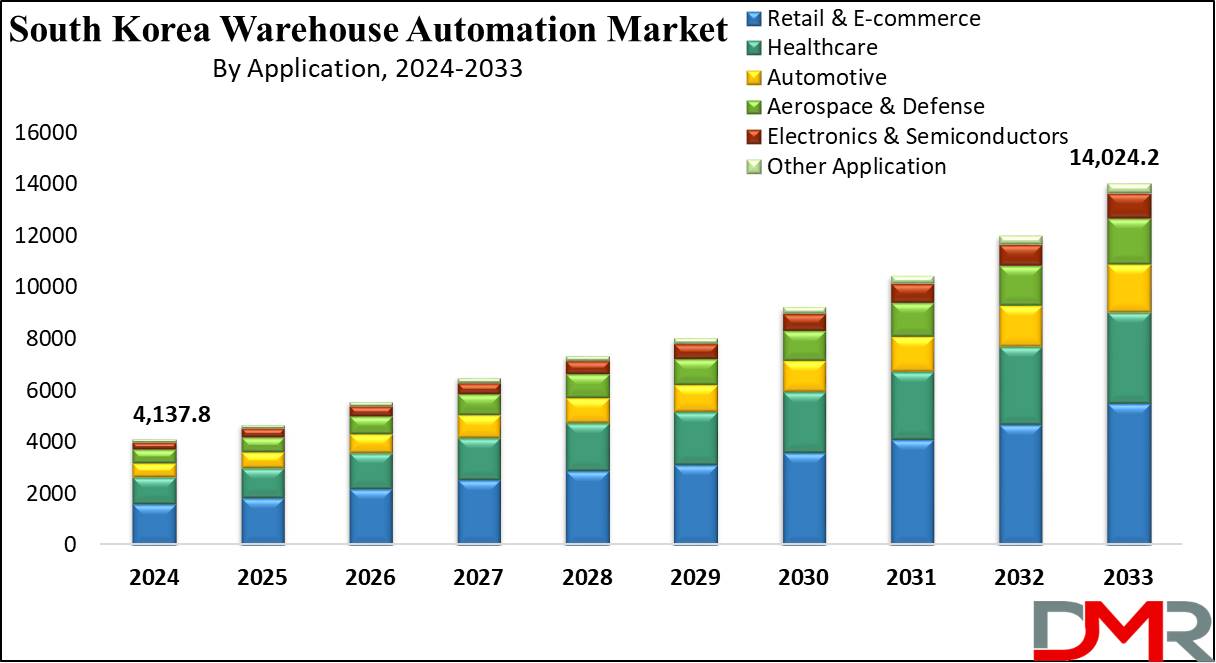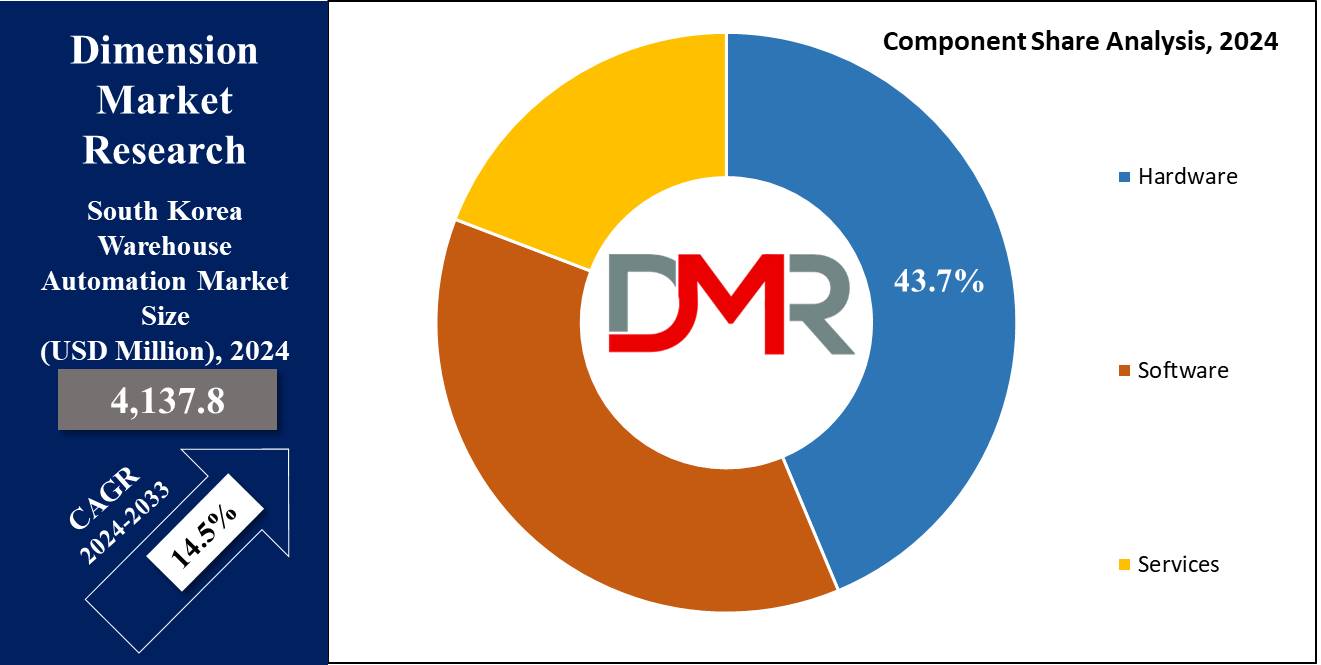New York, Nov. 19, 2024 (GLOBE NEWSWIRE) -- Overview
The South Korea Warehouse Automation Market is projected to reach USD 4,137.8 million in 2024 which is further anticipated to reach USD 14,024.2 million by 2033 at a CAGR of 14.5%.
Rising demand from industries such as retail, e-commerce, and manufacturing is, therefore, causing exponential growth in the South Korean warehouse automation market.
As a regional logistics hub, South Korea is ideal for automation investments, especially, since there is an imperative drive for investments in the automation of warehouses in South Korea impelled by the need to actuate efficient operations, reduce labor dependency, and improve supply chain management at all levels.
Click to Request Sample Report and Drive Impactful Decisions: https://dimensionmarketresearch.com/report/south-korea-warehouse-automation-market/request-sample/

Key technologies involved are automated storage and retrieval systems, robotics, mobile robots, conveyor systems, and WMS. The shortage of labor accelerates the adoption as companies look towards cost reduction and increasing productivity.
Strong future market growth has been ensured by leading players such as Hyundai Movex, Locus Robotics Korea, and SFA Corporation by offering diverse automation solutions.
Important Insights
- Market Value: The South Korean warehouse automation market is valued at USD 4,137.8 million in 2024 and is projected to reach USD 14,024.2 million by 2033.
- Component Segment Insights: Hardware is expected to dominate the component segment, accounting for 43.7% of the market share in 2024.
- Automation Level Segment Insights: Warehouse system automation will lead the automation level segment, holding the highest market share in 2024.
- Application Segment Insights: Retail and e-commerce are anticipated to be the dominant application segments, capturing 39.0% of the market share in 2024.
- Key Players: Major players include CJ Logistics, Hanjin Transportation, LG CNS, Korea Express, Hanjin Shipping, STX Logistics, and Hyundai Glovis, among others.
- Growth Rate: The market is experiencing a robust growth rate, expanding at a CAGR of 14.5% over the forecast period.
Latest Trends
- AI and Robotics Integration: AI and robotics are reshaping South Korea's warehouse automation market. Collaborative robots, or cobots, help increase efficiency in picking and packing processes by working right next to human workers. Predictive maintenance, facilitated by the power of AI-driven systems, means less downtime and increased productivity. As companies make digital transformation paramount, AI and robotics take center stage in innovation at the warehouse.
- Rise of E-commerce Fulfillment Centers: This is an explosive growth of e-commerce that is totally changing the face of warehousing, where fulfillment centers turn fully automated to allow for rapid order turnover. Among the technologies speeding up these processes, including increasing their accuracy and reducing processing time, there are automated storage and retrieval systems, conveyor belts, and mobile robots. Such a trend can be supported by the development of online grocery services and omnichannel retail.
South Korea Warehouse Automation Market: Competitive Landscape
In the competitive landscape of South Korea's warehouse automation market, both domestic and international players are trying to meet the increasing demand for efficiency.
Major companies include Hyundai Movex, SFA Corporation, and Locus Robotics Korea, among others, leading through various automation technologies, from robotics to AI-driven inventory management tools. Global firms such as Hik Robotics and AutoStore System Ltd also play a vital role in the market growth.
Furthermore, small companies like Mujin and Ocado Retail develop their solutions to target a niche, for example, the case of collaborative mobile robots. This market will be very competitive, with several strategic partnerships planned in mergers and acquisitions, boosting continuous innovation.
Some of the prominent market players:
- CJ Logistics
- Hanjin Transportation
- LG CNS
- Korea Express
- Hanjin Shipping
- STX Logistics
- Hyundai Glovis
- DB Schenker Korea
- Samsung SDS
- GS Global
- Kwangmyung Logistics
- DSV Panalpina
- Other Key Players
Transform your business approach with strategic insights from our report. Get in touch to request our brochure today! : https://dimensionmarketresearch.com/report/south-korea-warehouse-automation-market/download-reports-excerpt/
South Korea Warehouse Automation Market Scope
| Report Highlights | Details |
| Market Size (2024) | USD 4,137.8 Mn |
| Forecast Value (2033) | USD 14,024.2 Mn |
| CAGR (2024-2033) | 14.5% |
| Historical Data | 2018 - 2023 |
| Forecast Data | 2024 - 2033 |
| Base Year | 2023 |
| Estimate Year | 2024 |
| Segments Covered | By Component, By Automation Level, and By Application |
| Regional Coverage | South Korea |
Market Analysis
Hardware components are expected to dominate the South Korean warehouse automation market, with a market share of 43.7% by 2024. Robotics, automated guided vehicles, automated storage and retrieval systems, conveyor belts, and mobile robots are some important components of hardware that act as the spine of automated warehousing operations.
These technologies reduce dependence on labor, increase operational efficiency, and undertake tasks like order picking and packing far more accurately than can be achieved with manual labor.
As a result, major demand for even quicker logistics is continuing to drive investment in innovative hardware including AI-integrated collaborative robots into the South Korean market.
Purchase the Competition Analysis Dashboard Today: https://dimensionmarketresearch.com/checkout/south-korea-warehouse-automation-market/

South Korea Warehouse Automation Market Segmentation
By Component
- Hardware
- Autonomous Robots (AGV, AMR)
- Automated Storage and Retrieval Systems (AS/RS)
- Automated Sorting Systems
- De-Palletizing/Palletizing Systems
- Conveyor Systems
- Automatic Identification and Data Collection (AIDC)
- Software
- Warehouse Management System (WMS)
- Entry Function
- Location Function
- Stock Control Function
- Warehouse Execution Systems (WES)
- Labor Management Systems (LMS)
- Warehouse Management System (WMS)
- Services
- Analytics and Reporting Tools
- Consulting, Training & Education
- Installation And Integration
- Maintenance And Support
By Automation Level
- Basic Warehouse Automation
- Warehouse System Automation
- Mechanized & Advanced Warehouse Automation
By Application
- Retail & E-commerce
- Healthcare
- Automotive
- Aerospace & Defense
- Electronics & Semiconductors
- Other Application
Request Your Exclusive Sample Report at https://dimensionmarketresearch.com/report/south-korea-warehouse-automation-market/request-sample/
Growth Drivers
- There is a huge labor scarcity in South Korea, mainly in logistics, which has become one of the driving elements for automation in the warehouse sector. With the rapidly aging population and less interest in working for manual labor jobs, the need for automation systems, including robotics and automated guided vehicles, for sustaining productivity becomes the prime priority. Automation systems will help increase operational efficiency for which skilled workers can be scarce.
- According to the South Korean government, warehouse automation will help to enhance international competitiveness. Favorable policies, reforms in regulations, and tax benefits accelerate investment in the field of automation technologies by SMEs. Government programs are targeted at developing skills in robotics and automation, further driving the demand forward.
Restraints
- The high initial costs of automation technologies, including robotics and AI-driven solutions, slow adoption rates, particularly among SMEs. This kind of capital-intensive investment, combined with ongoing maintenance expenses, can be oppressive for an already-strained budget and may potentially dampen a company's interest in wide-ranging automation.
- Because companies cannot easily integrate the different automation technologies into their present warehouse operations, due to various issues, most companies do not efficiently integrate WMS with automated storage solutions. Technical capabilities and compatibility with legacy systems are also major complications in the automation of processes that deter large-scale integrations.
Growth Opportunities
- Online grocery shopping and food delivery facilitate increased demand, driving the demand for effective cold storage logistics. Investments in automation technologies, including AS/RSs, temperature-sensitive robotics, and AI-powered inventory systems, are key in handling the operations of cold storage with minimal spoilage rates and thus offering great opportunities among automation providers.
- AI and machine learning open new avenues in warehousing automation, with advanced predictive analytics-encompassing demand forecasting, inventory optimization, and reduction of waste. Driven by this, the demand for AI-driven automation solutions has also gone up as more companies from South Korea embraced the technology to further drive scalability and operational efficiency.
Discover additional reports tailored to your industry needs
- Drilling Fluids Market is expected to reach a value of USD 8,802.2 million in 2023 and grow with a CAGR of 4.8% for the forecasted period (2023-2032).
- Water Testing Equipment Market is expected to reach a value of USD 4,992.3 million in 2023, and it is projected to show a CAGR of 6.6% for the forecast period (2023 -2032).
- Demister Market is expected to reach a value of USD 2.1 billion in 2023, and it is further anticipated to reach a market value of USD 3.0 billion by 2032 at a CAGR of 4.1%.
- Micro Turbines Market is expected to reach a value of USD 179.0 million in 2023, and it is further anticipated to reach a market value of USD 435.4 million by 2032 at a CAGR of 10.4%.
- Industrial Tubes Market size is expected to be valued at USD 687.1 billion in 2024, and it is further expected to reach a market value of USD 1,373.0 billion by 2033 at a CAGR of 8.0%.
- Air Compressor Market size was valued at USD 28.2 Bn in 2024 and it is further anticipated to reach a market value of USD 43.7 Bn in 2033 at a CAGR of 5.0%.
- Vertical Roller Mill Market size is expected to reach a value of USD 608.5 million in 2024, and it is further anticipated to reach a market value of USD 1,041.2 million by 2033 at a CAGR of 6.1%.
- Aircraft Micro Turbine Engine Market is projected to reach USD 2.5 billion in 2024 and grow at a compound annual growth rate of 5.9% from there until 2033 to reach a value of USD 4.3 billion.
- Thermoplastic Solenoid Valves Market is projected to reach USD 389.1 million in 2024 and grow at a compound annual growth rate of 5.7% from there until 2033 to reach a value of USD 641.6 million.
- Core Cutters Market is projected to reach USD 299.9 million in 2024 and grow at a compound annual growth rate of 5.7% from there until 2033 to reach a value of USD 494.4 million.
Recent Developments in the South Korea Warehouse Automation Market
- October 2024: Locus Robotics deployed collaborative mobile robots in a major South Korean 3PL warehouse, enhancing order picking and inventory management to meet the rising demand for warehouse automation.
- September 2024: Hyundai Movex launched an AI-powered warehouse management system (WMS) designed to optimize inventory management, automate decision-making, and reduce costs, focusing on e-commerce's need for fast order fulfillment.
- August 2024: SFA Corporation partnered with AutoStore System Ltd. to integrate modular automated storage and retrieval systems (AS/RS) in South Korean warehouses, boosting storage capacity and operational efficiency in retail and e-commerce.
- July 2024: Hik Robotics introduced AI-driven robotic systems for cold storage, catering to the increasing demand for temperature-controlled logistics in online grocery and food delivery while enhancing safety and inventory control.
- June 2024: Mujin deployed AI-powered collaborative robots in South Korean warehouses to perform complex tasks such as palletizing and picking, improving operational flexibility and addressing labor shortages effectively.
- May 2024: Ocado Retail expanded its operations by partnering with a South Korean e-commerce platform, introducing robotic fulfillment systems to optimize order picking and packing, transforming grocery delivery with faster and more accurate services.
About Dimension Market Research (DMR):
Dimension Market Research (DMR) is a market research and consulting firm based in India & US, with its headquarters located in the USA (New York). The company believes in providing the best and most valuable data to its customers using the best resources analysts work, to create unmatchable insights into the industries, and markets while offering in-depth results of over 30 industries, and all major regions across the world.
We also believe that our clients don’t always want what they see, so we provide customized reports as well, as per their specific requirements to create the best possible outcomes for them and enhance their business through our data and insights in every possible way.
